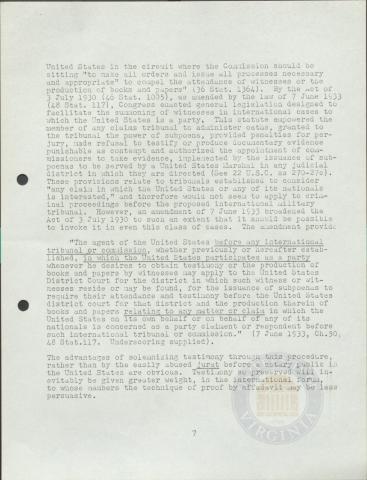
Page 7
| Parent | Perpetuation of testimony by Witnesses in U. S. for Presentation to International Military Tribunal |
|---|---|
| Date | 18 June 1945 |
| Language | English |
| Collection | Tavenner Papers & IMTFE Official Records |
| Box | Box 1 |
| Folder | General Reports and Memoranda from January 1946 |
| Repository | University of Virginia Law Library |
United States in the circuit where the Commission should be sitting "to make all orders and issue all processes necessary and appropriate" to compel the attendance of witnesses or the production of books and papers" (36 Stat. 1364). 3y "the Act of 3 July 1930 (46 Stat. 1005), as amended by the law of 7 June 1933 (48 Stat. 117), Congress enacted general legislation designed to facilitate the summoning of witnesses in international cases to which the United States is a party. This statute empowered the member of any claims tribunal to administer oaths, granted to the tribunal the power of subpoena, provided penalties for per¬jury, made refusal to testify or produce documentary evidence punishable as contempt and authorized the appointment of com-missioners to take evidence, implemented by the issuance of sub¬poenas to be served by a United States Marshal in any judicial district in which they are directed (See 22 U.S.C. ss 270-27c). These provisions relate to tribunals established to consider "any claim in which the United States or any of its nationals is interested," and therefore would not seem to apply to crim¬inal proceedings before the proposed international military tribunal. However, an amendment of 7 June 1933 broadened the Act of 3 July 1930 to such an extent that it should be possible to invoke it in even this class of cases. The amendment provide
"The agent of the United States before any international tribunal or commission, whether previously or hereafter estab¬lished, in which the United States participates as a party whenever he desires to obtain testimony or the production of books and papers by witnesses may apply to the United States District Court for the district in which such witness or wit¬nesses reside or may be found, for the issuance of subpoenas to require their attendance and testimony before the United States district court for that district and the production therein of books and papers relating to any matter or claim in which the United States on its own behalf or on behalf of any of its nationals is concerned as a party claiment or respondent before such international tribunal or commission." (7 June 1933, Ch.50; 48 Stat.117. Underscoring supplied).
The advantages of solemnizing testimony through this procedure, rather than by the easily abused jurat before a notary public in the United States are obvious. Testimony so preserved will in¬evitably be given greater weight, in the international forum, to whose members the technique of proof by affadavit may be less persuasive.
